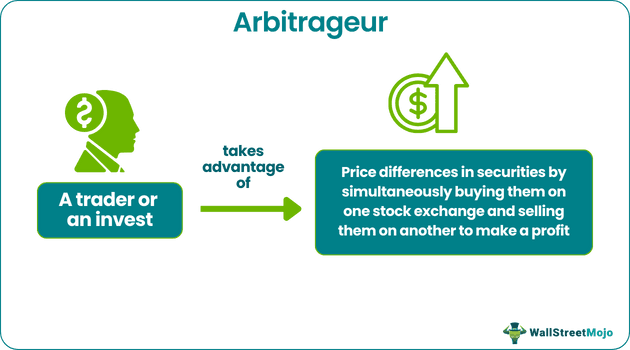Table Of Contents
Arbitrageur Meaning
An arbitrageur is a trader who aims to generate financial gains from the difference in a security’s price in different markets. They purchase financial assets from a market at a lower price and sell them in a different market at a higher price, thus generating a profit.

These market participants can earn risk-free gains by capitalizing on the inefficiencies in the financial markets. Such inefficiencies can relate to any market-related aspect, such as price, regulation, or dividends. That said, price is the most common form. These traders can also take advantage of private information concerning a company to make financial gains.
Key Takeaways
- The arbitrageur refers to the traders aiming to capitalize on inefficiencies in the financial markets to make financial gains. In other words, they simultaneously buy and sell financial assets in different markets to pocket the difference.
- Usually, retail investors do not engage in arbitrage trading as most do not have access to the required technical resources. Moreover, retail investors may not have sufficient funds to generate meaningful profits using arbitrage.
- Unlike speculators, hedgers and arbitrageurs are risk-averse.
- Individuals opting for the arbitrage strategy must consider the transaction costs before executing a trade.
Arbitrageur Explained
Arbitrage refers to traders who try to generate risk-free profits by taking advantage of market inefficiencies. Their actions lead to greater efficiency in the financial markets by causing the security prices to equalize.
The arbitrage strategy involves the simultaneous buying and selling of a financial instrument, like a stock, bond, etc., in different markets to earn risk-free profit. For instance, arbitrageurs in stock markets look for price differences between the securities listed on multiple stock exchanges by purchasing undervalued shares on one exchange and short-selling the exact quantity of the overvalued shares immediately on another exchange. They make risk-free financial gains by pocketing the difference as the security prices on the two stock exchanges converge.
Moreover, as noted above, in some cases, these traders aim to make profits by using private information about an organization. For example, if a trader has information regarding an impending acquisition, they may buy shares of the organization to profit from the future price increase.
Usually, institutional investors like banks and hedge funds utilize this trading strategy to make profits in financial markets owing to the time-sensitive nature and incremental price difference.
Retail investors trading securities via a smartphone find it difficult to execute an arbitrage trade as they lack the technical resources required to simultaneously buy and sell securities on more than one stock exchange. Moreover, the price difference can be very small. Hence, a trader would require substantial funds to earn a worthwhile profit.
Many traders use Saxo Bank International to research and invest in stocks across different markets. Its features like SAXO Stocks offer access to a wide range of global equities for investors.
Example
Let us look at this arbitrageur example to understand the concept better.
Suppose Stock XYZ is trading at $10 per share on the New York Stock Exchange (NYSE). At the same time, the stock is trading at $10.05 on the Toronto Stock Exchange (TSX). An arbitrageur can buy the shares on NYSE and immediately sell them on the TSX, generating a profit of 5 cents per share, less trading costs.
Risks For Arbitrageurs
From a theoretical standpoint, arbitrage is risk-free owing to the simultaneous purchase and sale of the security. Nevertheless, this type of trade comes with a certain degree of risk. This is because the difference in security prices lasts for a very short duration as the interaction of demand and supply forces automatically corrects the market. Sometimes, the price difference exists for less than a second. Hence, if traders cannot execute an arbitrage trade quickly, they may incur losses.
Moreover, the spread or margin is another risk that arbitrageurs in stock markets must bear. In most cases, the price difference is very small; it can even be a few cents. Therefore, a trader may suffer losses due to transaction costs after executing an arbitrage trade. That’s why traders must consider transaction costs before choosing the arbitrage strategy.
This type of trade is also risky when there’s a forthcoming merger. Although mergers can result in price differences in security prices, there’s always a chance that the companies might call off the deal. This can lead to a significant fall in the target company’s stock price, resulting in substantial losses for traders who executed an arbitrage trade.
Arbitrageur vs Hedger vs Speculator
Traders in the securities market try different strategies to generate a profit and maximize their portfolio returns. Some popular strategies are arbitrage, hedging, and speculation, and the individuals adopting them are arbitrageurs, hedgers, and speculators, respectively.
Knowing the key differences between the market participants is crucial for any individual willing to engage in securities trading. Hence, this table highlights the crucial differences between hedgers, speculators, and arbitrageurs in finance.
| Basis Of Comparison | Arbitrageurs | Hedgers | Speculators |
|---|---|---|---|
| Meaning | These traders aim to profit from the price difference in securities by simultaneously buying and selling them in different markets. | Hedgers take an offsetting position in a financial asset to reduce risk exposure. Contrary to speculators, they do not execute trades based on a hunch. | Speculators buy and sell securities based on assumptions and expectations. |
| Risk Appetite | They are risk-averse. | Hedgers primarily aim to reduce their risk exposure. They are not risk-loving by nature, unlike speculators. | Speculators have a high-risk appetite. |
| Suitability | Usually, investment banks, mutual funds, and other institutional investors opt for the arbitrage strategy owing to the requirement of technical resources. But, on the other hand, retail investors lack such resources. Hence, it might not be suitable for them. | Retail investors can be hedgers as they do not require technical resources like in the case of arbitrage. | Similar to hedgers, speculators do not require technical resources. Hence, any retail investor can be a speculator. |
Disclosure: This article contains affiliate links. If you sign up through these links, we may earn a small commission at no extra cost to you.
Frequently Asked Questions (FAQs)
Arbitrageurs in finance have the opportunity to profit from the price differences in securities by buying them in one market and immediately selling them in another. They can also use private information concerning an organization to generate financial gains. However, before opting for the arbitrage strategy, individuals must assess their risk profile and consider the transaction costs.
In a foreign exchange market, this type of trader generates profits from multiple rates offered by the brokers in different currency markets for the exact currency pair.
Yes, arbitrageurs amplify economic shocks as whether or not they can hold on to their positions in investments depends on the asset values.
Individuals opt for convertible arbitrage and simultaneously take long and short positions in a convertible bond and the underlying stock. They aim to profit from any price movement by having a proper hedge between long and short positions.

